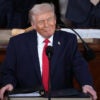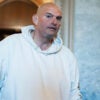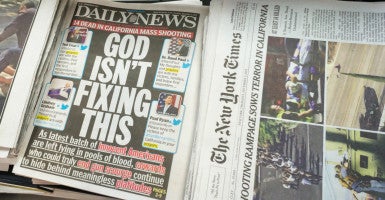The New York Daily News’ cover in the aftermath of the tragic San Bernardino, Calif., shootings is being heralded as provocative and challenging.
“God Isn’t Fixing This,” blares the cover, which features tweets from Republicans urging prayer after the shooting and then launches into a lecture: “As the latest batch of innocent Americans are left lying in pools of blood, cowards who could truly end gun scourge continue to hide behind meaningless platitudes.”
An early look at tomorrow’s front page… GOD ISN’T FIXING THIS: https://t.co/eKUg5f03ec pic.twitter.com/j4gEFg9YtJ
— New York Daily News (@NYDailyNews) December 3, 2015
“’Daily News’ provokes with cover on Calif. shooting: ‘God isn’t fixing this’” is USA Today’s headline, while “The New York Daily News’s very provocative front page on the San Bernardino shooting” is the Washington Post’s.
But is it such a provocative claim?
Talk to a person of faith, particularly someone who believes both in God’s goodness and that human beings have free will, and you’ll find that the “God Isn’t Fixing This” cover is a “dog bites man” kind of story.
Religious people aren’t idiots who have overlooked the fact, despite all the hours they spend on their knees praying for suffering to end, that suffering persists, that evil continues. Heck, the prayer that Jesus gave Christians specifically includes the line “deliver us from evil,” and Christ hardly suggested there was an expiration date on that line’s relevance. (Fun thought experiment: What would the New York Daily News have to change about today’s headline if the paper had a Jerusalem bureau a couple of millennia ago covering the crucifixion?)
Yet some are seeing this cover as a gotcha.
“New York Daily News Skewers Politicians Refusing To Act On Gun Violence,” crows the Huffington Post in a headline, while Business Insider announces that “Hard-hitting Daily News cover blasts Republicans for only offering ‘prayers’ after latest shooting.”
So let’s imagine an alternative cover: “New Laws Can’t Fix This.”
Because they can’t.
Some gun control advocates might think it’s incredibly naïve of religious people to think that prayer—even if not 100 percent effective, at least insofar as what constitutes effective in this world—could sometimes transform an evil person into a good man or woman, averting another tragedy.
But it’s also incredibly naïve to think that there’s a way to outlaw evil. People, including, yes, evil people, are creative: If they can’t get a hold of a gun legally, they may well try to do so illegally or simply use another kind of weapon. As a headline for a piece by The Federalist’s Mollie Hemingway observes, “The Left Prays After San Bernardino Shooting, To Its God Of Government.”
Nor do recent gun violence episodes suggest that anti-gun initiatives are always successful. “The Oregon shooting happened in a gun-free zone. The Lafayette movie theater shooting happened in a gun-free zone. The Chattanooga shootings happened in gun-free zones,” noted The Federalist’s Sean Davis.
Chicago has tough gun laws, and yet there’s no complete eradication of gun violence there, partly due to “the city’s high level of gang activity, and … gangs are both adept at procuring guns illegally and prone to involvement in shooting incidents,” as Bloomberg reported in October. In other words, it’s not clear how much laws would affect gangs (and others) determined to get guns.
Yes, there might be initiatives that could help curb, perhaps significantly, these mass shootings. Gun control is obviously the idea bandied about the most, in no small part because of President Barack Obama’s emphasis on it. But there’s also room for discussion about mental health treatment, police and security, and even perhaps whether making gun access less restrictive could allow a faster response to such horrific attacks.
But there is also room for prayer.
No, God isn’t Santa Claus, delivering requests on demand. (Although that does happen sometimes.) And the New York Daily News’ childish assumption that that is how religion works only proves the Daily News’ total lack of knowledge and familiarity with religion, not that the religious response to San Bernardino is problematic.































